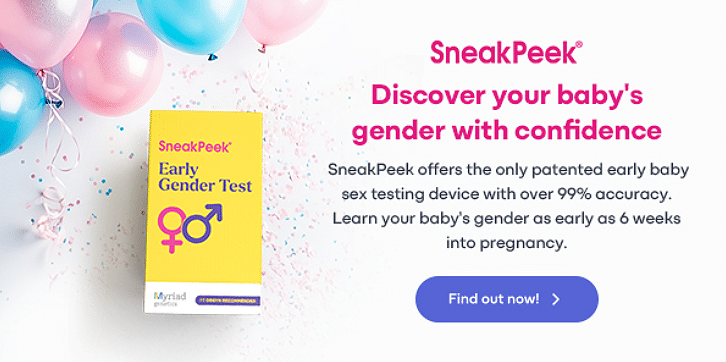Published on January 15th, 2024 and Updated on June 28th, 2025
Check out SneakPeek Gender Test to find out your baby’s gender as early as 6 weeks with over 99% accuracy!

Updated 6/28/2025
Genetic testing has become an accessible healthcare option anyone can use to better understand both individual and family needs. But when you’re pregnant, it’s not always clear what medical tools you can use safely or effectively to help you gain a clearer picture of your health. This begs the question, can you get a DNA test while pregnant?
Fortunately, a pregnant person may—and may even be encouraged to—pursue genetic testing to better understand their baby’s health profile. Prenatal screening, one of the most popular forms of DNA testing, can be used to screen for a variety of medical conditions so that you can feel more sure about your child’s future.
Whether you’re currently pregnant or planning on growing your family, get all the facts you need to know about the uses, benefits, and accessibility of DNA testing—a clinical practice that’s quickly becoming the standard around the world.
What is DNA testing (genetic testing)?
DNA (deoxyribonucleic acid) contains the genetic instructions that determine how your body grows and functions. Genetic testing analyzes your DNA to provide insights into your health, ancestry, and more. People use DNA testing for various reasons, such as:
- Identifying changes in genes causing medical conditions
- Identifying medical conditions that you can pass down to your unborn children (carrier screening testing)
- Prenatal testing to check for genetic conditions in a baby
These tests are quite safe and involve a simple blood or saliva sample sent to a lab. Costs vary depending on the test type, so it’s best to explore options and consult with healthcare professionals to find the most suitable test for your needs.
If you’re considering exploring your genetic makeup, you might be wondering, “How much is genetic testing?” The cost of genetic testing can vary based on the type of test and the provider. So, check the different testing options available to you and consult with healthcare professionals to determine the most suitable and cost-effective choice for your needs.
Can a pregnant person get DNA testing?
So, can you get a DNA test while pregnant?
The answer is yes—anyone can pursue genetic testing if they choose to do so. If you’re pregnant, you can still take a personal DNA test, but this will only screen your genetic material (not your baby’s).
A prenatal DNA test, on the other hand, is a common way of gathering information about your child—whether about their paternity or risk of inherited conditions. Many procedures are non-invasive and are conducted by retrieving a sample of a baby’s DNA through their mother. A variety of options are available for prenatal testing, as well as genetic testing that may be administered after your baby is born.
Prenatal Genetic Testing: What Are My Options?
NIPT: Noninvasive Prenatal Testing
One of the most popular forms of prenatal DNA testing is NIPT or noninvasive prenatal testing. In fact, medical societies now recommend that everyone consider NIPT during pregnancy.
NIPT (Noninvasive Prenatal Testing) is a widely used method to screen for genetic conditions in an unborn baby, such as Down syndrome, Edwards syndrome, and Patau syndrome. It involves a simple blood sample from the pregnant parent to analyze the baby’s DNA found in the bloodstream.
While NIPT isn’t diagnostic, it can identify the likelihood of certain health conditions or disabilities and is highly reliable— as demonstrated by the NIPT test gender accuracy, which is reported to be over 99%.
Not all NIPT tests screen for the same disorders, so you’ll want to speak with your healthcare provider to understand what type of information the test can offer.
Prenatal Genetic Testing
Prenatal genetic testing examines a fetus’ DNA for signs of genetic disorders. NIPT is the least invasive option and screens for conditions like Down syndrome, Edwards syndrome, and more.
Which are diagnostic include:
- Chorionic Villus Sampling (CVS): A sample from the placenta, done between 10-13 weeks.
- Amniocentesis: A sample of amniotic fluid, performed after 15 weeks
Not all tests offer the same insights, so it’s important to discuss options with your healthcare provider.
Preimplantation Testing (PGT-M)
PGT-M, or preimplantation testing-monogenic, is a form of genetic testing used by parents having a child through in vitro fertilization (IVF). Instead of screening fetal DNA, it examines an embryo’s genetic material before it’s transferred to the uterus.
PGT-M is only administered when a parent is worried they may pass a specific heritable genetic condition onto their child.
Preimplantation Genetic Testing for Aneuploidies (PGT-A)
PGT-A is another form of preimplantation genetic testing used during IVF. Unlike PGT-M, which targets specific single-gene disorders, PGT-A screens embryos for chromosomal abnormalities, such as missing or extra chromosomes. This screening helps identify embryos with the correct number of chromosomes, increasing the chances of a successful pregnancy and reducing the risk of miscarriage. PGT-A is commonly recommended for older women, those with recurrent pregnancy loss, or previous IVF failures.
Newborn Screening
Newborn screening tests are administered soon after a baby is born by taking a small (and quite painless!) heel stick from your new baby.
Newborn screening tests can check for a wider range of medical conditions—up to 50: —and many of these are important to identify and treat at birth to potentially prevent symptoms:
- Congenital adrenal hyperplasia (CAH)
- Cystic fibrosis
- Hemoglobinopathy
- Hypothyroidism
- Sickle cell disease
- Phenylketonuria (PKU)
Newborn screening is mandatory in most states—some 95% of newborns in the US are tested annually, of which about 3,000 are found to have at least one of the conditions tested. This type of testing ensures infants are treated early, promoting improved health outcomes both immediately and as they grow.
Is genetic testing safe?
Generally speaking, yes. Procedures involved in genetic testing are very safe.
Slightly more invasive prenatal testings—specifically, CVS and amniocentesis—carry a slight risk of miscarriage (under 0.5).
Benefits of Prenatal Genetic Testing
Pregnant or not, genetic testing technologies have multiplied families’ ability to care for themselves and their loved ones with more refined insight. Many parents feel that the more they can learn about their baby—and the earlier they can learn it—the more equipped and confident they’ll feel as they embark on a new family chapter.
Prenatal genetic testing is typically associated with the following benefits:
- Informed medical decision-making – Beyond making (and keeping) your regular prenatal appointments, prenatal care can involve complex and even challenging choices regarding how to give your child the best life possible. Knowing what conditions they may be at risk for can help you make important choices about establishing your pregnancy health regimen, as well as making birth plans and preparing for potential emergency situations.
- Preemptive planning – Certain medical conditions can bear significantly on how you raise and care for your baby. If a prenatal test detects a need for intervention, you’ll know earlier and be able to better adapt to any financial, practical, and emotional complications that may arise.
- Emotional security – Whether you’re concerned about passing on a condition that runs in your family or just want more confidence in your child’s well-being, prenatal testing offers a degree of psychological comfort. At times, the prospect of parenthood can feel uncertain, anxiety-provoking, or even daunting to many parents. Receiving concrete data about your child’s needs can help you start your journey with greater confidence.
Get to Know Your Child Better (and Sooner) with SneakPeek
Though some forms of prenatal genetic testing can reveal your baby’s gender at 8 weeks into pregnancy, the SneakPeek test can break the news even earlier. If you’re as few as 6 weeks along, SneakPeek’s Early Gender Blood Test will tell you your future baby’s sex with over 99% proven accuracy and DNA-based results.
The process is simple: you’ll typically take your sample at home, mail it to the labs, and we’ll triple-review your test results and send them back on the same day we receive them. You’ll even receive a complimentary downloadable report you can share with your healthcare provider.
More than 1 million parents have used SneakPeek to get to know their baby earlier. Discover for yourself why SneakPeek is the #1- OBGYN recommended at-home early gender test by ordering your test today.
As you learn about your baby’s gender, Prequel Prenatal Screen and Foresight® Carrier Screen from Myriad Genetics can provide even more critical insights into your baby’s health. These tests offer peace of mind as you prepare for the next steps. With Prequel®, you can get insights as early as 8 weeks, and with Foresight®, you can understand potential genetic risks. Myriad Genetics is with you every step of the way—helping you make informed decisions.
Editorial Policy
At SneakPeek, our commitment is to provide accurate, up-to-date, and reliable information to empower our readers. Our content is thoroughly researched, reviewed by medical experts, and fact-checked to ensure its credibility. We prioritize the well-being and education of our readers, and our editorial policy adheres to the highest standards of integrity and accuracy in all our articles.
This post has been reviewed for accuracy by the following medical professional:
Katie Smith is a seasoned Certified Nurse Midwife and a nurturing mother to six children, offering a unique blend of professional expertise and personal experience. She is the founder of Birth Your Way Midwifery and Women’s Wellness Center in Bay County, Florida. Katie's comprehensive approach to care is informed by her hands-on experience in motherhood and her passion for empowering women through their birthing journey. Her dedication extends beyond her center as she actively engages in community wellness and family health education.
Sources:
- National Library of Medicine. Recent trends in prenatal genetic screening and testing. https://www.ncbi.nlm.nih.gov/pmc/articles/PMC6545823/
- Medline Plus. What is DNA? https://medlineplus.gov/genetics/understanding/basics/dna/
- National Human Genome Research Institute. Deoxyribonucleic Acid (DNA) Fact Sheet. https://www.genome.gov/about-genomics/fact-sheets/Deoxyribonucleic-Acid-Fact-Sheet
- Harvard Health Publishing. Tempted to have genetic testing? First ask why. https://www.health.harvard.edu/blog/tempted-to-have-genetic-testing-first-ask-why-202108172571
- Mayo Clinic. Genetic testing. https://www.mayoclinic.org/tests-procedures/genetic-testing/about/pac-20384827
- VeryWell Family. Can I Get a DNA Test While Pregnant? https://www.verywellfamily.com/can-pregnant-women-get-a-dna-test-5198479
- Cleveland Clinic. NIPT Test. https://my.clevelandclinic.org/health/diagnostics/21050-nipt-test
- Cleveland Clinic. Chorionic Villus Sampling for Prenatal Diagnosis. https://my.clevelandclinic.org/health/diagnostics/4028-chorionic-villus-sampling-for-prenatal-diagnosis
- Cleveland Clinic. Amniocentesis. https://my.clevelandclinic.org/health/diagnostics/4206-genetic-amniocentesis
- The American College of Obstetricians and Gynecologists. Preimplantation Genetic Testing. https://www.acog.org/clinical/clinical-guidance/committee-opinion/articles/2020/03/preimplantation-genetic-testing
- VeryWell Family. PGT-M and PGT-A Genetic Screening Before IVF. https://www.verywellfamily.com/pgd-and-pgs-genetic-screening-before-ivf-4151705
- Johns Hopkins Medicine. Preimplantation Genetic Testing (PGT). https://www.hopkinsmedicine.org/gynecology-obstetrics/specialty-areas/fertility-center/infertility-services/preimplantation-genetic-testing
- National Library of Medicine. Understanding Genetics: A District of Columbia Guide for Patients and Health Professionals – Newborn Screening. https://www.ncbi.nlm.nih.gov/books/NBK132148/








